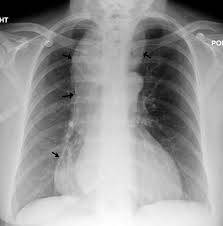Achalasia is a rare esophageal motility disorder characterized by the inability of the lower esophageal sphincter to relax and difficulty in moving food down the esophagus into the stomach. Here are 20 potential causes, signs and symptoms, effects, and solutions related to achalasia:
**Causes:**
1. **Idiopathic:** In most cases, the cause is unknown (idiopathic).
2. **Autoimmune:** An autoimmune response may damage the esophageal nerves.
3. **Genetic Predisposition:** It can run in families.
4. **Viral Infections:** Certain infections may trigger an autoimmune response.
5. **Neurological Disorders:** Conditions affecting the nervous system.
6. **Inflammation:** Inflammation of the esophagus may contribute.
7. **Environmental Factors:** Exposure to toxins or pollutants.
8. **Hormonal Changes:** Hormonal factors may play a role.
9. **Psychological Stress:** Stress may exacerbate symptoms.
10. **Radiation Therapy:** Previous chest radiation can be a risk factor.
11. **Gastroesophageal Reflux Disease (GERD):** Chronic reflux may contribute.
12. **Infections:** Certain infections may damage the esophageal nerves.
13. **Injury or Trauma:** Previous chest injuries or trauma.
14. **Medications:** Some medications may affect esophageal function.
15. **Scleroderma:** A connective tissue disease that can impact the esophagus.
16. **Chagas Disease:** A parasitic infection that can affect esophageal nerves.
17. **Multiple System Atrophy:** A rare neurological disorder.
18. **Vagus Nerve Disorders:** Damage or dysfunction of the vagus nerve.
19. **Hereditary Factors:** Rare genetic mutations can be a cause.
20. **Chronic Stress:** Prolonged stress may contribute to symptoms.
**Signs and Symptoms:**
1. **Dysphagia:** Difficulty swallowing, especially with solids.
2. **Regurgitation:** Food and liquid may flow back into the mouth.
3. **Chest Pain:** A dull, aching pain in the chest or upper abdomen.
4. **Heartburn:** Due to the backup of stomach contents.
5. **Weight Loss:** Gradual weight loss due to difficulty eating.
6. **Cough:** Persistent cough, sometimes with aspiration.
7. **Wheezing:** Wheezing or asthma-like symptoms.
8. **Nighttime Choking:** Episodes of choking during sleep.
9. **Pain or Discomfort:** In the chest, throat, or upper abdomen.
10. **Hiccups:** Frequent and prolonged hiccups.
11. **Frequent Throat Clearing:** Due to irritation.
12. **Respiratory Infections:** Recurring pneumonia or bronchitis.
13. **Halitosis:** Bad breath due to regurgitated food.
14. **Esophageal Spasms:** Occasional painful spasms of the esophagus.
15. **Fatigue:** Due to disrupted sleep and malnutrition.
16. **Dehydration:** Difficulty in swallowing fluids.
17. **Anxiety:** Anxiety related to difficulty eating.
18. **Salivation:** Excessive salivation due to difficulty swallowing.
19. **Foul Taste:** A foul or metallic taste in the mouth.
20. **Food Stuck in Chest:** Sensation of food getting stuck in the chest.
**Effects:**
1. **Malnutrition:** Inadequate nutrient intake due to difficulty eating.
2. **Weight Loss:** Gradual weight loss is common.
3. **Aspiration Pneumonia:** Inhaling food or fluids into the lungs.
4. **Esophageal Dilation:** Enlargement of the esophagus over time.
5. **Esophageal Strictures:** Narrowing of the esophagus from scarring.
6. **Esophageal Diverticula:** Pouches or outpocketings of the esophagus.
7. **Barrett's Esophagus:** Precancerous changes in the esophageal lining.
8. **Reduced Quality of Life:** Due to symptoms and dietary restrictions.
9. **Psychological Impact:** Stress, anxiety, and depression.
10. **Chest Pain:** Discomfort and pain may persist.
11. **Respiratory Issues:** Breathing difficulties and lung problems.
12. **Social Isolation:** Limited ability to eat or drink in social settings.
13. **Chronic Cough:** Ongoing cough can be distressing.
14. **Sleep Disturbances:** Disrupted sleep due to symptoms.
15. **Gastrointestinal Problems:** May affect digestion and bowel movements.
16. **Cardiovascular Complications:** Increased risk of heart issues.
17. **Increased Risk of Cancer:** In some cases, achalasia can lead to esophageal cancer.
18. **Dental Problems:** Acid exposure can harm tooth enamel.
19. **Esophageal Perforation:** Rare but serious complication.
20. **Adverse Effects of Medications:** Side effects of treatments.
**Solutions:**
1. **Pneumatic Dilation:** A procedure to stretch the lower esophageal sphincter.
2. **Heller Myotomy:** Surgical removal or cutting of the muscle causing the blockage.
3. **Peroral Endoscopic Myotomy (POEM):** A minimally invasive procedure to treat achalasia.
4. **Botulinum Toxin Injection:** Temporary relief by relaxing the sphincter.
5. **Medications:** Medications may be prescribed to manage symptoms.
6. **Dietary Modifications:** Eating soft, moist foods and avoiding triggers.
7. **Smoking Cessation:** Quitting smoking to improve esophageal health.
8. **Weight Management:** Achieving and maintaining a healthy weight.
9. **Stress Management:** Techniques to reduce stress and anxiety.
10. **Elevation:** Elevating the head of the bed to prevent reflux.
11. **Regular Follow-Up:** Ongoing monitoring and treatment adjustments.
12. **Speech Therapy:** To address swallowing difficulties.
13. **Psychological Support:** Managing the emotional impact of the condition.
14. **Nutritional Support:** Supplements or feeding tubes if necessary.
15. **Esophageal Botox Injections:** Temporary relief of symptoms.
16. **Proton Pump Inhibitors:** To reduce acid reflux symptoms.
17. **Anti-Anxiety Medications:** If anxiety is a significant factor.
18. **Chiropractic Care:** Some individuals find relief with chiropractic treatment.
19. **Acupuncture:** May offer symptom relief for some patients.
20. **Lifestyle Adaptations:** Modifying daily activities and diet for comfort.
Treatment for achalasia should be tailored to the individual's specific condition and needs, and consulting a healthcare professional is essential for proper diagnosis and management.



No comments yet
Be the first to share your thoughts!